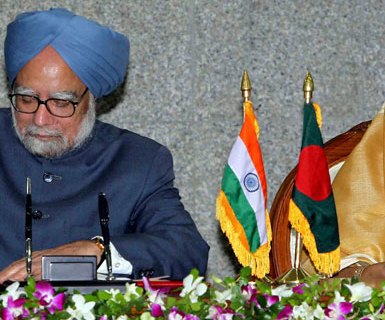
On 6th September 2011 Indian Prime Minister Dr. Manmohan Singh paid a visit to Dhaka, Bangladesh for a two day state visit. This visit has been hyped by the media on both sides as one of the landmark visits in taking the relationship between Bangladesh and India to a new high. When Sheikh Hasina visited India in January 2010 she signed a 50-point joint communiqué that paved the way for India to fulfill all their demands from Bangladesh. In return India pledged to sign a series of protocols related to long standing border disputes, reviewing BSF shoot to kill policy against innocent Bangladeshi Muslims and an agreement on water sharing of Teesta River during Indian prime minister’s to Bangladesh.
Therefore naturally the Bangladeshi side was very optimistic about Manmohan’s visit with newspapers carrying headlines such as “It’s time for India to deliver”. The ruling party of Sheikh Hasina trumpeted the visit to sway public opinion here in Bangladesh that Indian friendship with Bangladesh is unbreakable and we cannot think otherwise. Manmohan’s visit was expected to include a number of high level diplomats and ministers and provincial chief ministers including the West Bengal Momota Benarjee. Bangladeshi prime minister and foreign minister repeatedly said this time around India will deliver on her promises to silence any critics within Bangladesh like Hizb ut-Tahrir who has successfully galvanized almost the entire public sentiments within Bangladesh that Mushrik India is an enemy state to Bangladesh.
Indeed when the time came, India revealed its true colors, when just before the day of Manmohan’s visit, on 5th September, 2011 the Indian foreign minister openly declared that the Teesta River sharing treaty, a 40 year old Indian promise, will not be signed with Bangladesh. While this has been the announcement from the Indian foreign ministry press conference, Bangladeshi foreign minister Dr. Dipu Moni claimed that, the treaty will be signed. But on the next day in the official meeting between the sides the treaty was not signed. In the meantime to save her political career and bring Bangladeshi public opinion to her side Sheikh Hasina has reportedly agreed not to sign the transit treaty with India, which was later on published by a certain quarter of newspapers as a ‘bold stance’. Some reported that “No Teesta, No Transit”. Moreover the government highlighted the protocol signed on disputed enclaves, Indian agreement on duty free access of 46 garment items to the Indian market from Bangladesh and limited transit to Bhutan from Bangladesh. Thus Hasina tried her best to portray Manmohan’s visit as a successful one.
However the Muslims of Bangladesh know for sure the true color of India. The government has tried to sell to the people that since there has been no agreement on Teesta therefore there was no agreement on Transit. But if we take a look on this issue of the Teesta River water sharing issue, which India has promised 40 years back, it is well known that any international river should not be used by any state in the upstream of the river, which affects the natural flow of the river. Therefore, the barrage put by India in the upstream in Assam and in West Bengal to divert the flow of the Teesta water is a clear violation of international norms. In fact Bangladesh shares 54 joint rivers with India. Now if it takes 40 years to reach an agreement with India regarding one river, it will take 2160 years to solve all of these river disputes! The natural flow of water in all these 54 rivers is a natural right for Bangladesh, while the issue of transit which is effectively a corridor to India is not an Indian right; India is not a landlocked country and India has her own routes to go to the seven sister states. Therefore the attempt by Hasina and her opportunistic so called civil society to link the deal on Teesta with transit is in fact another act of treachery.
Regarding the issue of an Indian agreement to tariff free 46 garment items, we can clearly see the big hole in such propaganda. Indian has on paper agreed to allow 46 garment items tariff free access to the Indian market. However, there is the issue of non-tariff barriers such that once someone from Bangladesh wishes to export garment items to the Indian market, they will sell it through Benapole port. However, before the good enters into the Indian market, it must be tested whereby each item will be taken to Bangalore for testing while the goods wait in the warehouse, which increases the warehouse costing and thus reduces the competitiveness of Bangladeshi garment items! In fact India has many more of such cards to play which in reality will not realize the promise that Manmohan has signed on paper.
Thus a proper scrutiny reveals that the visit by the Indian prime minister to Bangladesh only highlights the Indian hypocrisy which has historical roots. India is a mushrik state and will continue to play in its own path. It is up to the Muslims and the civil and military influentials in Bangladesh to act decisively to stop Hasina from selling the interests of the country for her political fortune.
20/09/2011
Jafar Muhammad Abu Abdullah
Bangladesh
